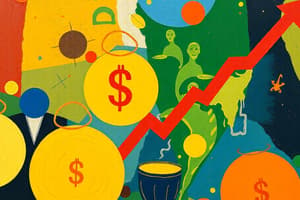Podcast
Questions and Answers
What is a primary focus of microeconomics?
What is a primary focus of microeconomics?
- Evaluating the aggregate income of an economy
- Understanding the overall price levels in an economy
- Studying the economic behavior of individual decision-making units (correct)
- Analyzing economic trends on a national scale
Which of the following best characterizes macroeconomics?
Which of the following best characterizes macroeconomics?
- It deals largely with production decisions of individual firms.
- It examines national income, output, and price levels. (correct)
- It primarily studies individual markets in isolation.
- It focuses on the cost of goods and services at a micro level.
What does the central problem of microeconomics aim to solve?
What does the central problem of microeconomics aim to solve?
- Maximizing profits through resource allocation (correct)
- Determining levels of income and employment
- Achieving full employment across the economy
- Evaluating government policies on economic growth
Which of the following is NOT a branch of microeconomics?
Which of the following is NOT a branch of microeconomics?
How does macroeconomics primarily gather its information?
How does macroeconomics primarily gather its information?
Which issue would development economics specifically focus on?
Which issue would development economics specifically focus on?
What is a typical concern of welfare economics?
What is a typical concern of welfare economics?
What role does microeconomics play in an economy?
What role does microeconomics play in an economy?
What is the primary focus of economics as a discipline?
What is the primary focus of economics as a discipline?
What was a significant contribution of Adam Smith to economics?
What was a significant contribution of Adam Smith to economics?
Which of the following best describes the concept of scarcity in economics?
Which of the following best describes the concept of scarcity in economics?
What is a common misconception about the nature of economics?
What is a common misconception about the nature of economics?
What fundamental problem does economics address?
What fundamental problem does economics address?
Which definition encompasses the main objective of economics?
Which definition encompasses the main objective of economics?
Which of the following statements accurately reflects a characteristic of human wants?
Which of the following statements accurately reflects a characteristic of human wants?
In what way does choice relate to the field of economics?
In what way does choice relate to the field of economics?
Flashcards
Economics
Economics
A social science studying efficient resource allocation to maximize human needs fulfillment.
Scarcity
Scarcity
Limited resources in relation to unlimited wants.
Resource Allocation
Resource Allocation
The process of deciding how to distribute limited resources to produce goods and services.
Unlimited Human Needs
Unlimited Human Needs
Signup and view all the flashcards
Adam Smith
Adam Smith
Signup and view all the flashcards
Basic Economic Problem
Basic Economic Problem
Signup and view all the flashcards
Choice in Economics
Choice in Economics
Signup and view all the flashcards
Economic Resources
Economic Resources
Signup and view all the flashcards
Scope of Economics
Scope of Economics
Signup and view all the flashcards
Microeconomics
Microeconomics
Signup and view all the flashcards
Macroeconomics
Macroeconomics
Signup and view all the flashcards
Micro vs. Macro
Micro vs. Macro
Signup and view all the flashcards
Central Problem of Microeconomics
Central Problem of Microeconomics
Signup and view all the flashcards
Central Problem of Macroeconomics
Central Problem of Macroeconomics
Signup and view all the flashcards
Microeconomic Tools
Microeconomic Tools
Signup and view all the flashcards
Macroeconomic Tools
Macroeconomic Tools
Signup and view all the flashcards
Study Notes
Economics: A Social Science
- Economics, derived from the Greek word for "household management," is a social science approximately 200 years old.
- Adam Smith, considered the father of economics, published An Inquiry into the Nature and Causes of the Wealth of Nations in 1776, marking a pivotal moment in the field's evolution.
- There's no single, universally accepted definition of economics; various perspectives (wealth, welfare, scarcity, growth) shape its evolving scope.
- Modern, commonly accepted definition: Economics studies the efficient allocation of scarce resources to maximize fulfillment of unlimited human needs. It examines how individuals, using limited productive resources (land, labor, equipment, knowledge), produce goods.
Economic Concepts and Principles
- Key to economics: The interplay of unlimited human wants and limited resources (scarcity), leading to choices.
- Economics studies how societies make these choices, evaluating efficiency, equity, and stability.
- Choices are made on individual, family and national levels.
Scope and Branches of Economics
- Scope expands to diverse topics including development, industrial, transport, welfare, and environmental economics.
- Core branches:
- Microeconomics: Studies individual economic units like households, firms, and markets, focusing on price determination and resource allocation. Tools like demand and supply are crucial. It addresses production, consumption, and profit-maximization decisions.
- Macroeconomics: Analyzes the overall economy, examining aggregate behavior (national income, employment, general price levels), and aggregate demand and supply. It looks at economy-wide phenomena like growth and fluctuation.
Studying That Suits You
Use AI to generate personalized quizzes and flashcards to suit your learning preferences.
Description
This quiz explores the fundamental concepts of economics, including its historical context and key principles such as scarcity and resource allocation. It highlights influential figures like Adam Smith and examines the evolution of economic definitions. Test your knowledge on how societies address the challenge of fulfilling unlimited needs with limited resources.




